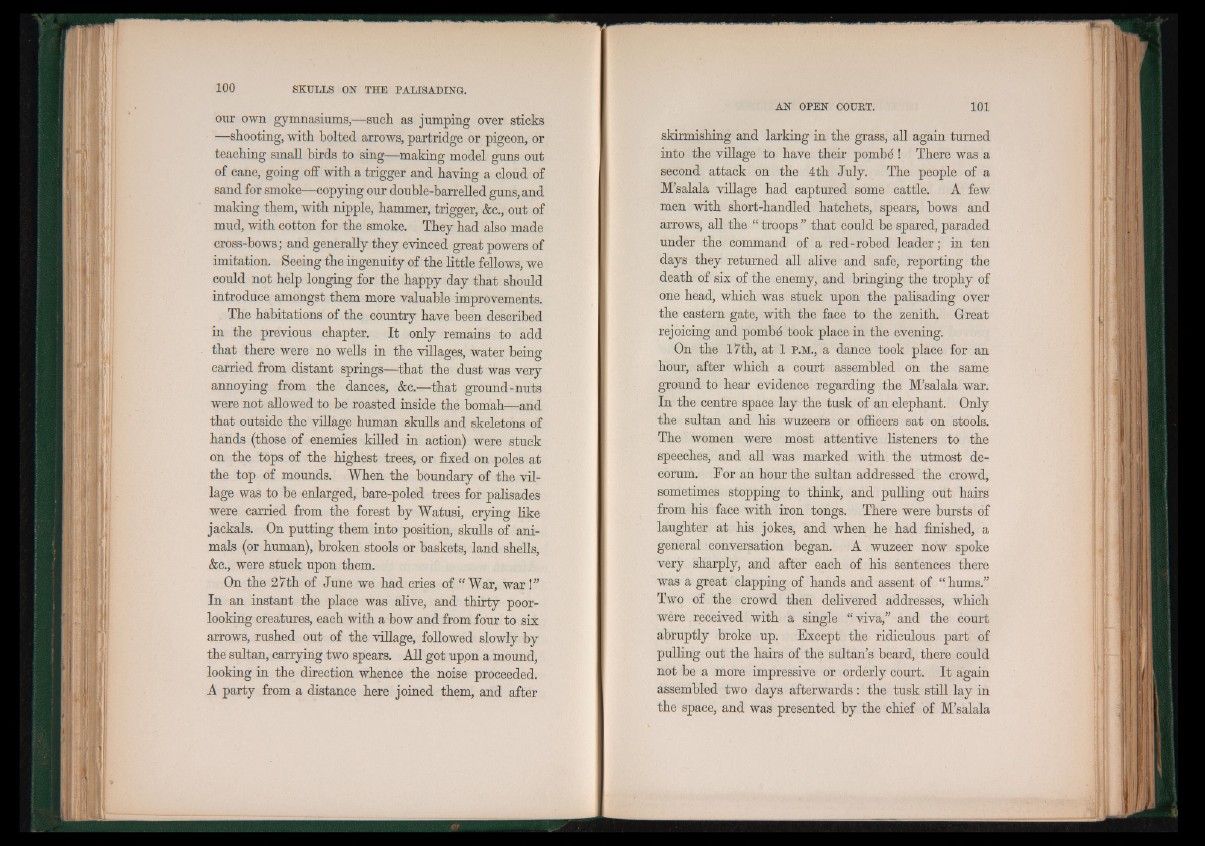
our own. gymnasiums,—such as jumping over sticks
—shooting, with bolted arrows, partridge or pigeon, or
teaching small birds to sing—making model guns out
of cane, going off with a trigger and having a cloud of
sand for smoke—copying our double-barrelled guns, and
making them, with nipple, hammer, trigger, &c., out of
mud, with cotton for the smoke. They had also made
cross-bows; and generally they evinced great powers of
imitation. Seeing the ingenuity of the little fellows, we
could not help longing for the happy day that should
introduce amongst them more valuable improvements.
The habitations of the country have been described
in the previous chapter. I t only remains to add
that there were no wells in the villages, water being
carried from distant springs—that the dust was very
annoying from the dances, &c.—that ground-nuts
were not allowed to be roasted inside the bomah—and
that outside the village human skulls and skeletons of
hands (those of enemies killed in action) were stuck
on the tops of the highest trees, or fixed on poles at
the top of mounds. When the boundary of the village
was to be enlarged, bare-poled trees for palisades
were carried from the forest by Watusi, crying like
jackals. On putting them into position, skulls of animals
(or human), broken stools or baskets, land shells,
&c., were stuck upon them.
On the 27th of June we had cries of “War, war!”
In an instaut the place was alive, and thirty poor-
looking creatures, each with a bow and from four to six
arrows, rushed out of the village, followed slowly by
the sultan, carrying two spears. All got upon a mound,
looking in the direction whence the noise proceeded.
A party from a distance here joined them, and after
skirmishing and larking in the grass, all again turned
into the village to have their pombd ! There was a
second attack on the 4th July. The people of a
M’salala village had captured some cattle. A few
men with short-handled hatchets, spears, bows and
arrows, all the “ troops ” that could be spared, paraded
under the command of a red-robed leader; in ten
days they returned all alive and safe, reporting the
death of six of the enemy, and bringing the trophy of
one head, which was stuck upon the palisading over
the eastern gate, with the face to the zenith. Great
rejoicing and pombd took place in the evening.
On the 17th, at 1 p .m ., a dance took place for an
hour, after which a court assembled on the same
ground to hear evidence regarding the M’salala war.
In the centre space lay the tusk of an elephant. Only
the sultan and his wuzeers or officers sat on stools.
The women were most attentive listeners to the
speeches, and all was marked with the utmost decorum.
For an hour the sultan addressed the crowd,
sometimes stopping to think, and pulling out hairs
from his face with iron tongs. There were bursts of
laughter at his jokes, and when he had finished, a
general conversation began. A wuzeer now spoke
very sharply, and after each of his sentences there
was a great clapping of hands and assent of “ hums.”
Two of the crowd then delivered addresses, which
were received with a single “ viva,” and the court
abruptly broke up. Except the ridiculous part of
pulling out the hairs of the sultan’s beard, there could
not be a more impressive or orderly court. I t again
assembled two days afterwards : the tusk still lay in
the space, and was presented by the chief of M’salala